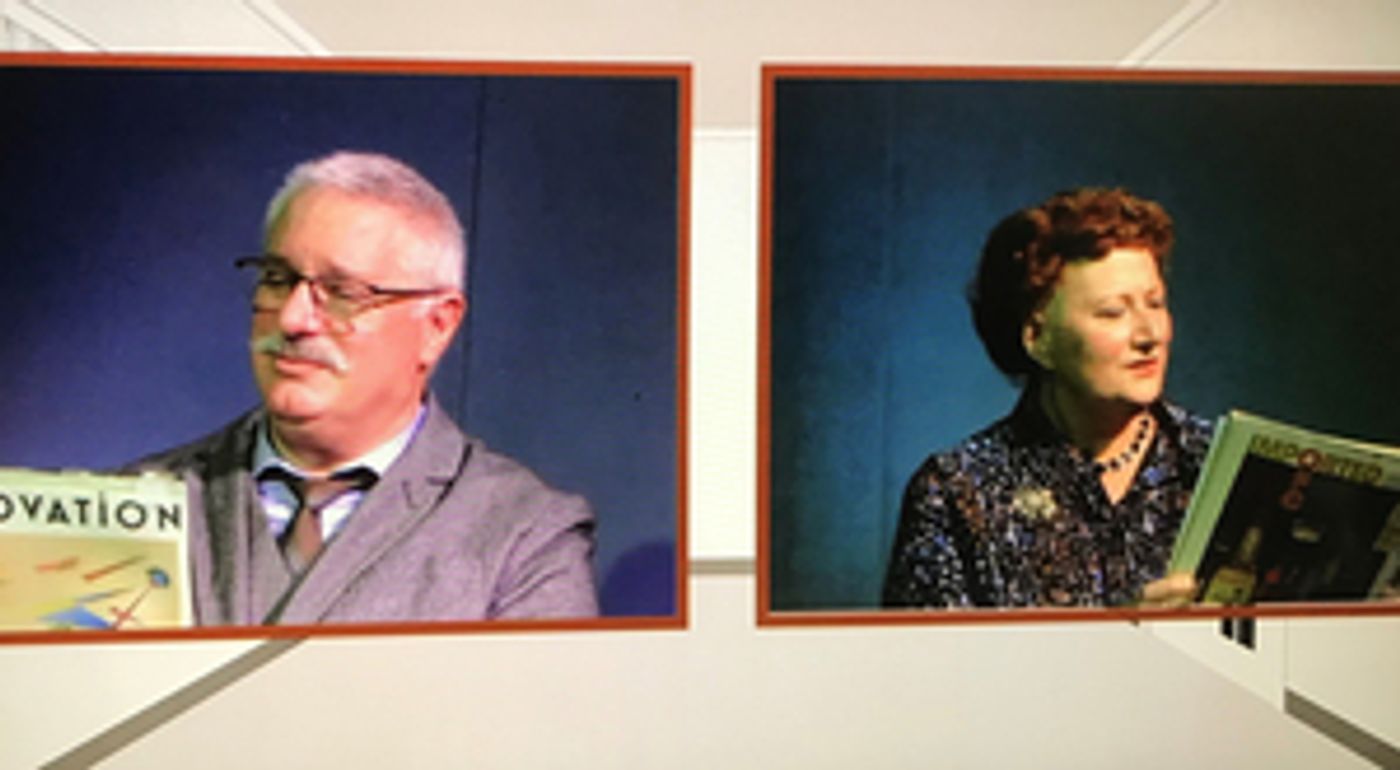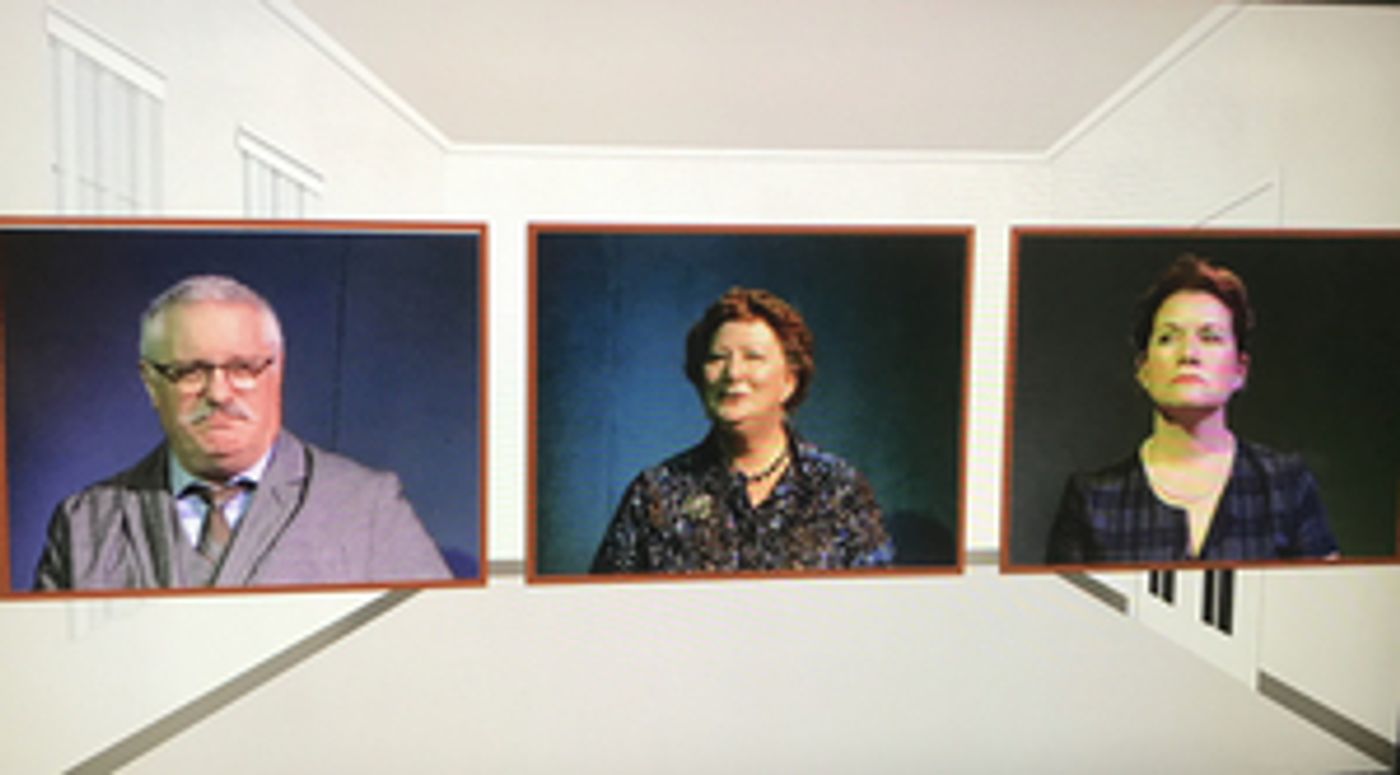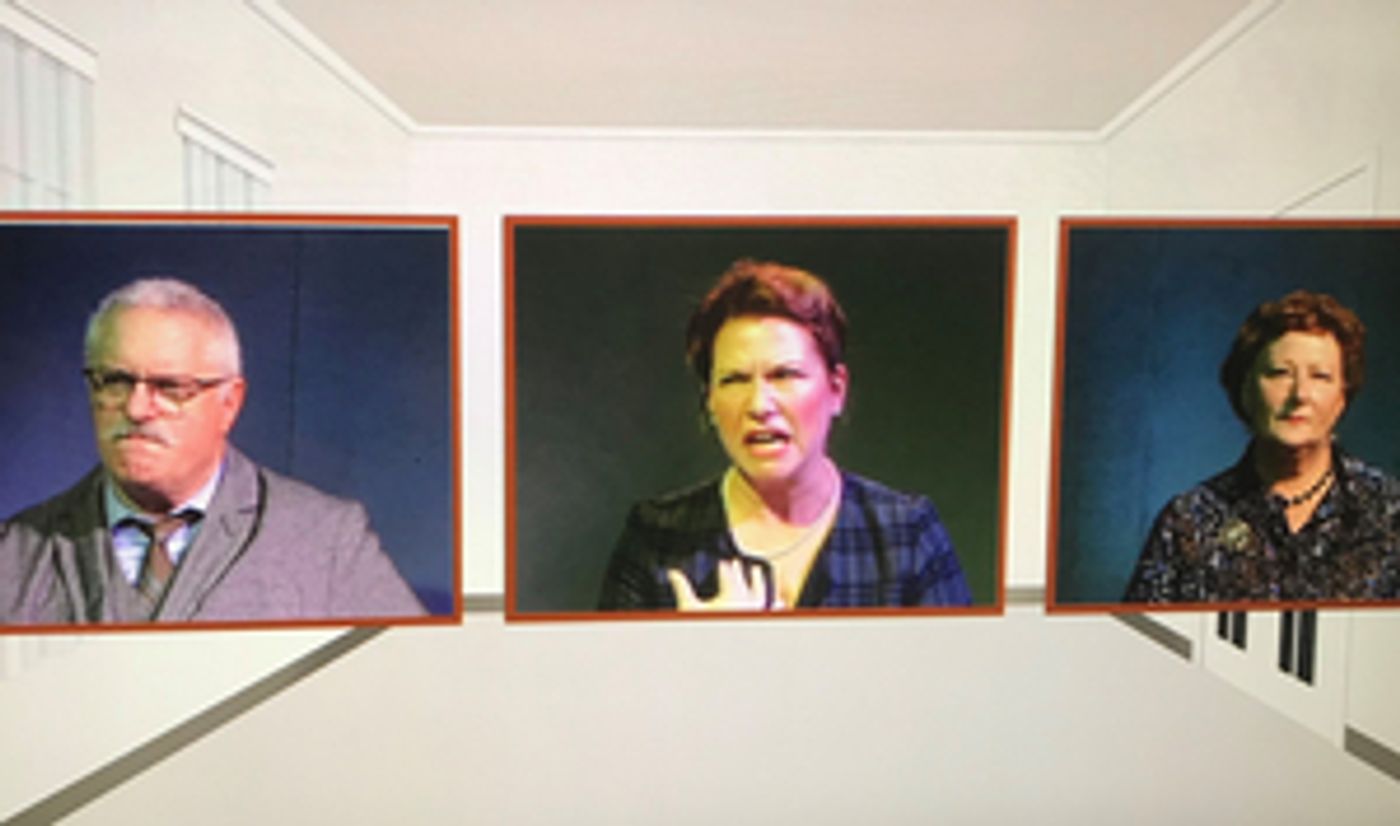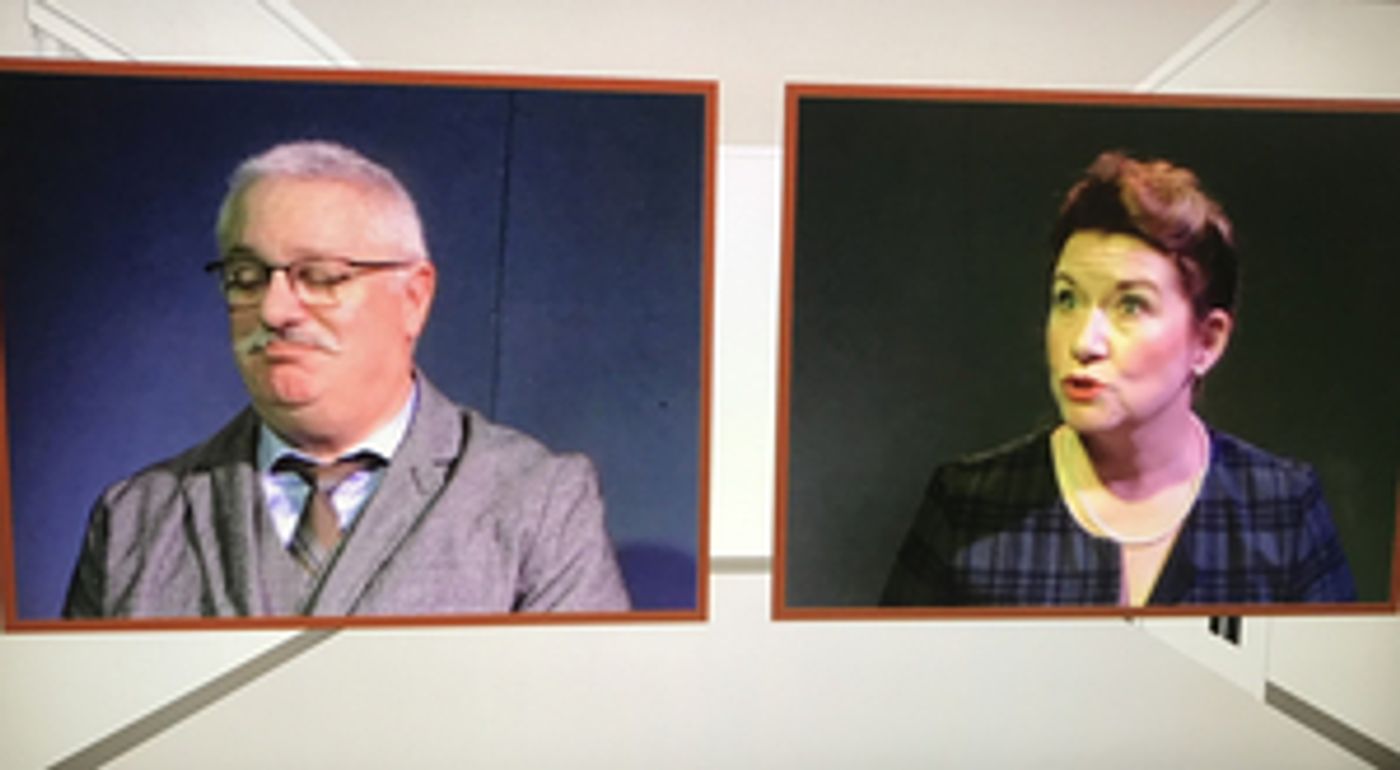Feature: BAUER Continues PLAY-AT-HOME Series by Torrance Theatre Company
on October 18 and 25

For the past few months, I have been enjoying the PLAY-AT-HOME series of nine plays being presented online by Torrance Theatre Company. What makes their virtual theater series unique from others is that each play is being broadcast live from within the walls of their theater, staged on three pre-set playing areas separated far enough apart to follow COVID-19 safety guidelines for the cast and production team. As such, the small-cast groups of actors are actually reading each of the plays while in the same room together rather than at individual home locations. The challenge, of course, is for each director to make sure each actor's reactions to the others match how their placement together will be seen online in separate boxes, which may not match their actual physical locations on set.
 On Sunday, October 18th, I tuned in for Lauren Gunderson's BAUER, directed with precision placement onscreen by Cary Jordahl, whose talented cast (Elizabeth A. Bouton, Shirley Hatton and Don Schlossman) embodied the full range of their characters' human emotions absolutely brilliantly. If you missed it that night, please make plans to catch it during its encore presentation for 24 hours on-demand on Sunday, October 25th. Tickets are $20 and can be purchased on www.TorranceTheatreCompany.com/PLAY-AT-HOME, after which a private link will be emailed for viewing access.
On Sunday, October 18th, I tuned in for Lauren Gunderson's BAUER, directed with precision placement onscreen by Cary Jordahl, whose talented cast (Elizabeth A. Bouton, Shirley Hatton and Don Schlossman) embodied the full range of their characters' human emotions absolutely brilliantly. If you missed it that night, please make plans to catch it during its encore presentation for 24 hours on-demand on Sunday, October 25th. Tickets are $20 and can be purchased on www.TorranceTheatreCompany.com/PLAY-AT-HOME, after which a private link will be emailed for viewing access.
I have to admit I had never heard of the German artist Rudolf Bauer prior to seeing the play, so I thank Torrance Theatre Company's Producing Artistic Director Gia Jordahl for providing the following background on his work and life, which will also assist other audience members in grasping much of the artist's background discussed in the play.
Rudolf Bauer was a major influence in the non-objective art movement in Europe in the 1920s and 1930s. He was eventually imprisoned by the Nazi's,  and later rescued by Hilla von Rebay and Solomon Guggenheim, who was taken by Bauer's work and was going to build a new museum in New York where Bauer's work would be the anchor. Bauer was brought to the U.S., and Hilla arranged a contract with Guggenheim that would give Bauer comfort and security; but unbeknownst to Bauer, it would also strip him of all rights to his current and future work. This hard fact apparently crushed the spirit of the great artist, and he never painted again, literally disappearing from the art world. And once Guggenheim passed away, Hilla was removed from the museum's board and Bauer's work was relegated to the basement, not to be seen in any significant exhibit until almost six decades after his death.
and later rescued by Hilla von Rebay and Solomon Guggenheim, who was taken by Bauer's work and was going to build a new museum in New York where Bauer's work would be the anchor. Bauer was brought to the U.S., and Hilla arranged a contract with Guggenheim that would give Bauer comfort and security; but unbeknownst to Bauer, it would also strip him of all rights to his current and future work. This hard fact apparently crushed the spirit of the great artist, and he never painted again, literally disappearing from the art world. And once Guggenheim passed away, Hilla was removed from the museum's board and Bauer's work was relegated to the basement, not to be seen in any significant exhibit until almost six decades after his death.
 In BAUER, Lauren Gunderson imagines a meeting between Bauer, his ex-lover and staunch advocate, Hilla von Rebay, and his current wife Louise Bauer in his locked-for-many years art studio in 1953. Each has their own reason for agreeing to the meeting, hoping for the best outcome for their own personal reasons. While the play's dramatically, confrontational reunion between Bauer and Hilla may not be factual, the details of the heated exchanges between them are rooted firmly in facts. And as secrets are revealed and new alliances formed, in the end the show has much to say about betrayal, forgiveness, the right of artists to their work, the power of love, and the power of art in the world.
In BAUER, Lauren Gunderson imagines a meeting between Bauer, his ex-lover and staunch advocate, Hilla von Rebay, and his current wife Louise Bauer in his locked-for-many years art studio in 1953. Each has their own reason for agreeing to the meeting, hoping for the best outcome for their own personal reasons. While the play's dramatically, confrontational reunion between Bauer and Hilla may not be factual, the details of the heated exchanges between them are rooted firmly in facts. And as secrets are revealed and new alliances formed, in the end the show has much to say about betrayal, forgiveness, the right of artists to their work, the power of love, and the power of art in the world.
 I cannot imagine a more perfect cast to represent this trio of fiery characters than Elizabeth A. Bouton as Louise, Shirley Hatton as Hilla, and Don Schlossman as Bauer, each of whom mastered German accents which added much to the authenticity of the characters, both in spirit and temperament. From flowing tears to exploding bouts of personal attacks, these actors totally immersed themselves with the kind of courage to express their performance art in the same way the two women in Bauer's life attempt to encourage him to express his personal artistic inspiration into his artistic vision. Kudos to the actors for sharing theirs with us from moment-to-moment, scene-to-scene in BAUER.
I cannot imagine a more perfect cast to represent this trio of fiery characters than Elizabeth A. Bouton as Louise, Shirley Hatton as Hilla, and Don Schlossman as Bauer, each of whom mastered German accents which added much to the authenticity of the characters, both in spirit and temperament. From flowing tears to exploding bouts of personal attacks, these actors totally immersed themselves with the kind of courage to express their performance art in the same way the two women in Bauer's life attempt to encourage him to express his personal artistic inspiration into his artistic vision. Kudos to the actors for sharing theirs with us from moment-to-moment, scene-to-scene in BAUER.
 Torrance Theatre Company's PLAY-AT-HOME series for the remainder of 2020 with THE VELOCITY OF AUTUMN by Eric Coble, ANNAPURNA by Sharr White, BEYOND GLORY written by Stephen Lang based on the book by Larry Smith, DRIVING MISS DAISY by Alfred Uhry, and ending with A CHRISTMAS CAROL: A LIVE RADIO PLAY adapted for the stage by Joe Landry from the novella by Charles Dickens, with music by Kevin Connors.
Torrance Theatre Company's PLAY-AT-HOME series for the remainder of 2020 with THE VELOCITY OF AUTUMN by Eric Coble, ANNAPURNA by Sharr White, BEYOND GLORY written by Stephen Lang based on the book by Larry Smith, DRIVING MISS DAISY by Alfred Uhry, and ending with A CHRISTMAS CAROL: A LIVE RADIO PLAY adapted for the stage by Joe Landry from the novella by Charles Dickens, with music by Kevin Connors.
For more information and to purchase tickets, visit www.TorranceTheatreCompany.com/PLAY-AT-HOME. If you have questions, please call (424) 243-6882. Torrance Theatre Company is a program of the Cultural Services Division of the Torrance Community Services Department. www.TorranceCA.Gov and sponsored in part by Friends of Torrance Theatre Company.
Screenshot photos provided by Torrance Theatre Company
Videos

